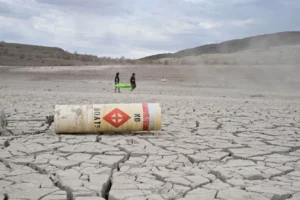Writing in the Los Angeles Times on Monday, Bill McKibben and Rev. Lennox Yearwood, Jr. urged President Joe Biden’s administration to block “a massive fossil fuel buildout” being proposed in Louisiana. The argument they make is worth journalists’ attention, for it highlights a central challenge often overlooked in climate coverage.
It’s indisputably good news that solar, wind, batteries, and other climate-friendly energy sources have been plummeting in cost and gaining market share, because this can reduce demand for fossil fuels. But reducing the supply of fossil fuels is the true measure of successful climate policy, because global temperatures will keep rising until the world stops burning those fossil fuels.
The fossil fuel industry has no intention of letting that happen. ExxonMobil just announced a $60 billion purchase of a rival oil and gas producer, signaling that Exxon plans to sell vast amounts of fossil fuel for decades. The United Arab Emirates is expanding its production capacity by 7.5 billion barrels of oil equivalent, even as Sultan Al Jaber, who heads UAE’s state-owned oil company while also presiding over next month’s COP28 summit, insists that he favors a net-zero future.
The contradiction at the heart of the climate fight, as Paris Agreement architect Christiana Figueres told the recent “Climate Changes Everything” conference, is that climate-friendly technologies are accelerating even as fossil fuel industry intransigence keeps greenhouse gas emissions climbing. This is the contradiction that our reporting needs to spotlight and explain to audiences.
In Louisiana, oil and gas companies want to construct an array of pipelines and terminals to export liquid natural gas. The climate implications are enormous, partly because LNG is as carbon intensive as coal. The proposed CP2 terminal alone would “be responsible for 20 times more greenhouse gas emissions annually than the controversial Willow oil drilling project in Alaska” that Biden approved earlier this year, McKibben and Yearwood write, according to analysis by the US Environmental Protection Agency and Interior Department cited by the Sierra Club.
Journalists do not have to be in Louisiana to report this story. As Damian Carrington and Matthew Taylor revealed last year in their “carbon bombs” expose for the Guardian, scores of similar climate-busting projects are being proposed or developed all over the world.
Incredibly, governments and public lending agencies are spending trillions of dollars to subsidize such climate-wrecking fossil fuel production. In 2022, they paid out $7 trillion in fossil fuel subsidies, the International Monetary Fund calculated. “That’s a definition of insanity,” John Kerry, the US special envoy for climate change, said two years ago in the lead-up to COP26.
As journalists prepare to cover the COP28 summit starting November 30 and elections in the US and elsewhere next year, it’s essential we understand — and help our audiences understand — that fossil fuels have to go, soon, if a livable planet is to be preserved. Questions to explore in your reporting include: How much is your country’s government spending to subsidize fossil fuels? And what is your country doing — or failing to do — to stop burning the fossil fuels that are dangerously overheating the planet?
Source : Covering Climate Now











Add Comment